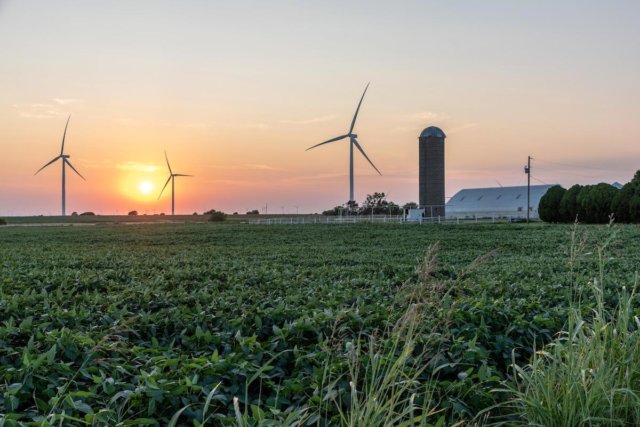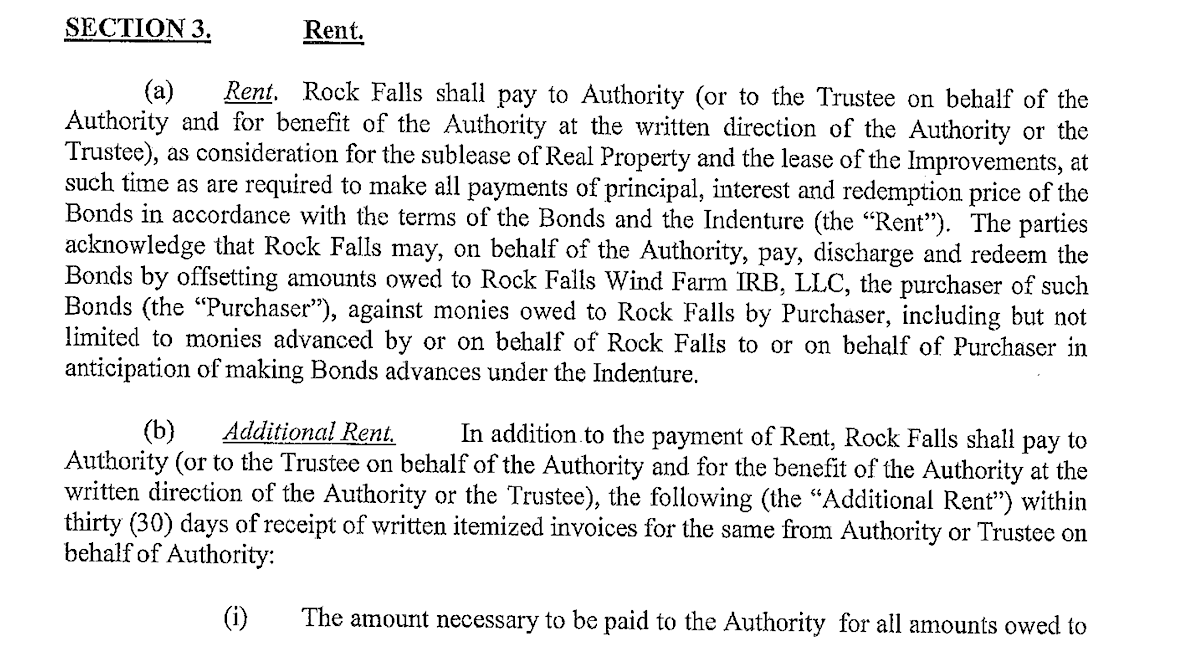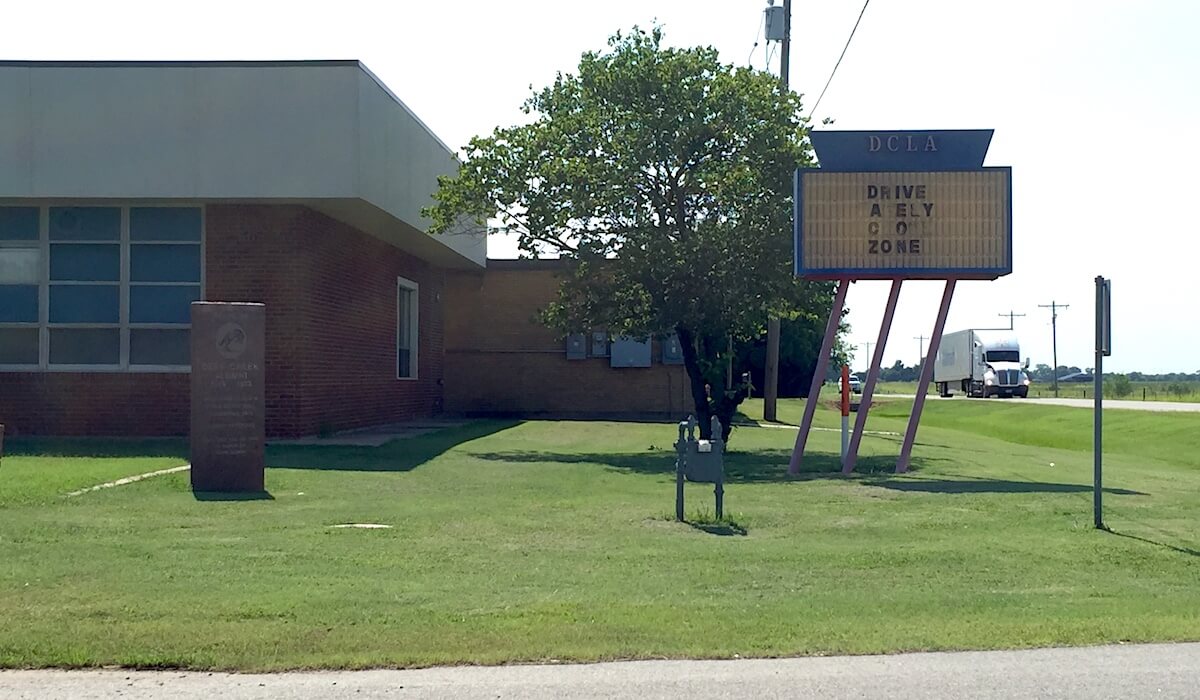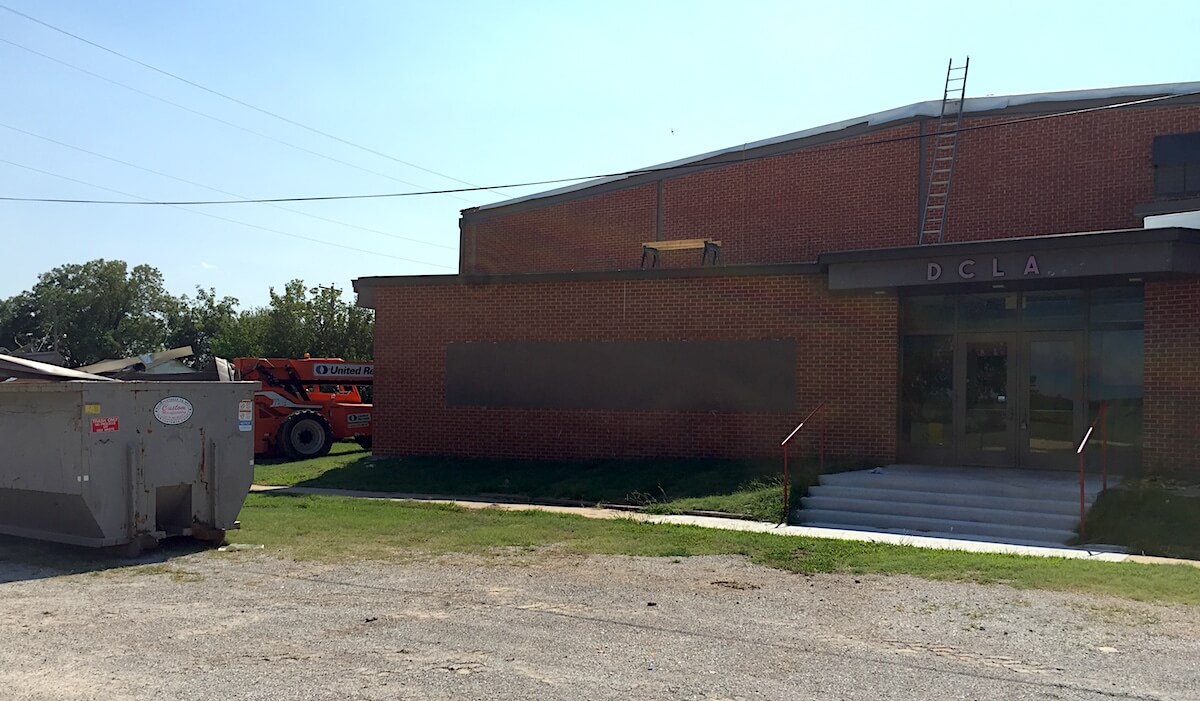

What do you get by pursuing an economic development project that involves two Oklahoma counties, three school districts, a school bond, a municipal trust, a wind farm and an international energy conglomerate partially owned by the sovereign nation of France?
Lawsuits, of course.
Pending litigation over the property tax obligations of Rock Falls Wind Project in Grant and Kay counties could set dramatic new precedents and fundamentally change the way wind-energy projects are incentivized in Oklahoma.
In addition, the complex legal battle could upend the fiscal footing of a $2.5 million school bond approved in March by Deer Creek-Lamont, a 183-student rural school district just west of I-35 along the Kansas border.
At issue is whether the Blackwell Economic Development Authority legally owns the Rock Falls Wind Project, which features 61 turbines across Kay and Grant counties.
The BEDA financed the wind farm by issuing $220 million of renewable energy “lease revenue bonds.” Those bonds were purchased by and the wind farm is now subleased to subsidiaries of EDF Energy, a London-based integrated energy company whose own parent is Électricité de France.
Signed in November 2017, the sublease between BEDA and Rock Falls Wind Farm, LLC features a convoluted “rent” agreement:

BEDA director John Robertson said his organization technically owns the wind farm, which would exempt the development from property or “ad valorem” taxes that are determined annually by county assessors.
“If we didn’t have the relationship, yes, they would be paying the ad valorem,” Robertson said. “It saves EDF money. It replaced an incentive that the state took off the table. Had we not gotten involved, it would not have happened. So yes, you’re giving up something for 10 years, but you would get nothing had we not stepped up.”
Counties reject wind farm exemption, lawsuits filed

Construction on the Rock Falls project began Jan. 13, 2017, according to Sandi Briner, EDF Renewable Energy vice president of corporate communications. The turbines came “online” and began producing electricity in December 2017.
Soon thereafter, Robertson said BEDA applied with Grant and Kay counties for property tax exemptions. Both counties denied the municipal trust’s request, causing the BEDA and Rock Falls Wind Farm, LLC to file lawsuits challenging the denials.
If the project ultimately receives property tax exemptions, the precedent could spur other municipalities to create similar agreements for incentivizing wind energy investment in Oklahoma, even though state tax-incentive programs have been repealed.
“When the state took away the five-year ad valorem abatement (effective January 2017), it was after that when the idea came up,” Robertson said. “Our idea was to replace that five-year ad valorem abatement over a 10-year period. That was the initial concept. This [wind farm] was about not to happen, and we were able to step up and offer this alternative.”
Robertson said his organization initially “kept a lid on” details in an effort to make sure no other municipal development authority would move to copy their idea before Rock Falls came online.
“Then it was in the paper and all over (the place),” Robertson said, adding that other municipalities have completed similar economic development initiatives.
Robertson: ‘We realize we are fishing in their pond’

Around the time BEDA and EDF Renewable Energy were finalizing their agreement, Deer Creek-Lamont Superintendent Barbara Regier was helping propose a $2.5 million construction bond for a new multi-purpose building at the district’s K-8 campus, just 14 miles west of Blackwell on State Highway 11.
Estimates for the school bond took into account the new Rock Falls Wind Farm, which swooped west from the outskirts of Blackwell across the wheat and soybean fields of Grant County, population 4,500.
“They didn’t communicate it to the schools at all,” Regier said of BEDA’s proposed property tax exemption for Rock Falls Wind Farm. “They communicated it to the county assessors and treasurers, I guess. They didn’t contact the school and tell us they were trying to file an exemption. That was not done.”
On March 6, Deer Creek-Lamont voters passed their bond proposal 151-69. Robertson said that, the day prior, he received a phone call from a banker asking if what he had heard about BEDA’s property tax plan was true.
“They had just put the dots together realizing, wait a minute, we won’t have the income stream that we expected,” Robertson said. “The banker said they needed a quarter of a million dollars a year, and I said, ‘That ain’t going to happen.'”
If the property tax exemptions are approved, Robertson said BEDA would be making voluntary payments to Deer Creek-Lamont and Newkirk Public Schools, since the wind farm sits within both districts. But he said Blackwell leaders invested in the wind farm primarily to help Blackwell Public Schools and other community needs.
“Blackwell is the lowest-funded school system in the county, and we are going to work on making some of that equity. They have gutters in the classroom, for god’s sake. Rather than fix the roof, let’s get it over in the bucket where we want it. That’s terrible,” Robertson said. “Even the schools that are touched, we are going to make donations. It won’t be near what they would have made income-wise (on) ad valorem, but we are still going to make donations to them over the next 10 years.”
Regier characterized the situation as “unfair.”
“Blackwell doesn’t have a school district that has any of the wind turbines in that wind farm,” she said. “It would affect Newkirk and Deer Creek-Lamont. It doesn’t affect Blackwell at all. It doesn’t seem like they should have any part in the project as far as a school district is concerned.”
Robertson, who is also the director of the Blackwell Area Chamber of Commerce and the Blackwell Industrial Authority, said he understands how the project details could rub some people the wrong way.
“We realize we are fishing in their pond. We get that. But I go back to (how) it would be $0 had we not gotten involved,” Robertson said. “That’s the key to the whole thing. And then (the other school districts) have 15 years of income, which is going to be, oh I don’t know, the $15 to 20 million range, I would suspect. A lot more than we are getting.”
Regier said the court cases could have broad policy implications for Oklahoma’s education system.
“I think it would drastically affect the whole state if this would go through,” Regier said. “My reaction to it is if they allowed companies to do that, it would set precedent for the whole state and no one would want to pay taxes. So it kind of seemed unlikely that it could be done. For one, Blackwell Economic Development Authority is in Kay County, and we are in Grant County. So how can they take our money? It doesn’t make sense.”
Follow @NonDocMedia on:
District Attorney Mike Fields: ‘Outcome of the litigation is important’

Grant County Assessor Robin Herod and Kay County Assessor Susan Keen have each been named as defendants in suits brought by Rock Falls Wind Farm and BEDA. The plaintiffs seek court declaration that the wind farm is exempt from property taxes.
District 4 District Attorney Mike Fields represents Grant County and was one of two lawyers to sign Herod’s filed response. While he declined to get into the merits of the litigation, Fields said “there really are some issues here.”
“Obviously, the outcome of the litigation is important because of the potential amount of money involved, both to the corporation and to the county and the school districts,” Fields said.
Herod said the Rock Falls Wind Project features 41 turbines, transmission lines and a substation in Grant County alone, totalling an estimated taxation of $1.26 million.
“It’s pretty significant for the Deer Creek-Lamont School District because I believe they were counting on the wind farm income to help subsidize their bond,” Herod said. “If I remember correctly when it first came into play, there was talk about [the proposed exemption]. I was real leery. I was trying to just caution people that this could be a possibility.”
Upon its completion, Rock Falls Wind Farm became a primary source of electricity for the Jenks, Oklahoma, operations of bathroom-tissue manufacturer Kimberly-Clark.
Briner, EDF’s communications vice president, said Tuesday she would attempt to set up an interview with a colleague more familiar with Rock Falls, but no interviews were scheduled despite requests Wednesday.
Superintendent: ‘Not what was represented to the community’

Regier said she has spoken to Grant County residents who signed leases allowing Rock Falls Wind Farm turbines to be placed on their property. If BEDA is granted its requested tax exemption, the superintendent said she believes people will be frustrated.
“Some people would be upset by it because [this is] not what was represented to the community and the land owners when they signed up,” Regier said. “They talked about how they were going to help the schools by their taxes. And then when they come down to it, they are filing an exemption before they ever even get to that point.”
But Robertson said Blackwell city leaders were doing their best to incentivize the wind farm, draw jobs to the area and establish a long-term funding stream that could extend 15 years after BEDA’s sublease operation agreement concludes.
“Hindsight, again, we’re not unique in our capacity to do it,” Robertson said. “So what we didn’t want to have happen was the Woodwards of the world or Bartlesville or Ponca or Oklahoma City for that matter — any of those guys to realize, ‘Oh, we have the capacity to do this.’ We wanted to be those guys.
“Any future (project) going forward, we’ve learned a lot. We’ll be involving everybody way up front.”




















